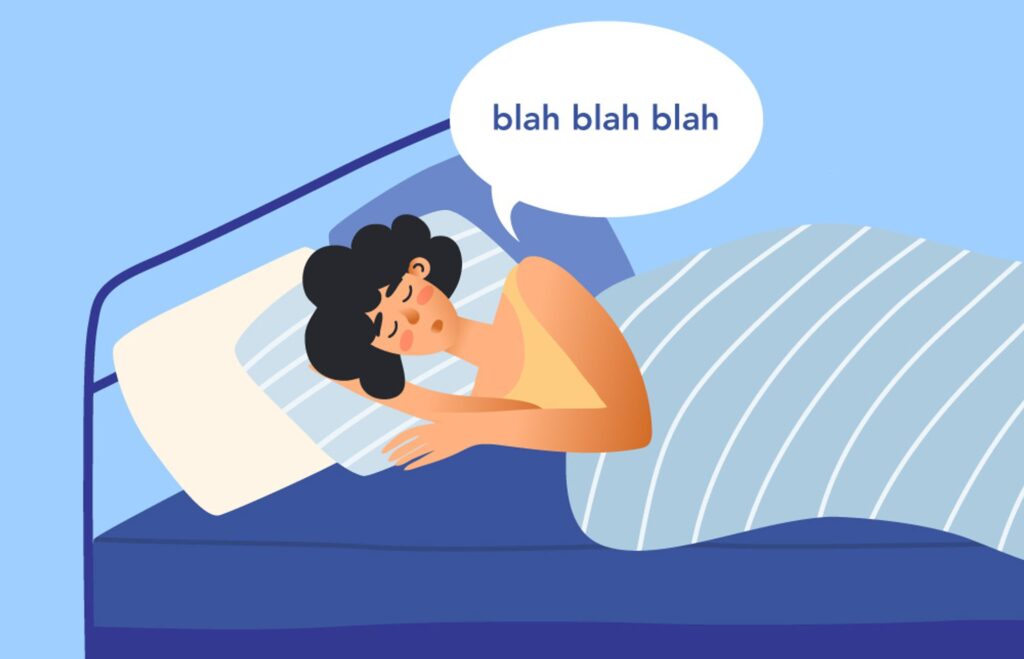
Long Story Short
- Sleep talking, or somniloquy, is a harmless sleep disorder in which you talk while you are sleeping.
- About 65 percent of people sleep talk at some point in their life, and sleep talking occurs in 50 percent of children. (1)
- Sleep talking can be triggered by stress, caffeine, illness, fever, or certain medications. (2)
- No treatments exist for sleep talking in particular, but you can lessen the chatter by practicing good sleep hygiene and treating underlying conditions. (3)
- If your sleeping partner talks so much in sleep that your slumber suffers, you can try ear plugs, white noise, or even a temporary sleep divorce to catch up on your zzzs.
You may have discovered you talk in your sleep early in life after a slumber party or a camping trip. Talking in your sleep is fairly common and may manifest as mumbled nonsense or fully logical monologues — with plenty of other options in between!
Sleep talking doesn’t hurt you, but it could point to an underlying sleep condition. You can start speaking at any point during the sleep cycle, and plenty of partners, parents, and siblings can attest to it. (1)
Note: The content on Sleepopolis is meant to be informative in nature, but it shouldn’t be taken as medical advice, and it shouldn’t take the place of medical advice and supervision from a trained professional. If you feel you may be suffering from any sleep disorder or medical condition, please see your healthcare provider immediately.
What Is Sleep Talking?
Also known as somniloquy, sleep talking is just what it sounds like — talking in your sleep. (1) As the sleep-talker, you are more likely to be overheard than to notice yourself doing it — often, a sleeping partner identifies this nighttime habit. Sleep talking is classified as a parasomnia, a particular type of sleep disorder. (2)
The term “parasomnia” covers any abnormal behavior during sleep and also includes sleepwalking and nightmare disorder, although sleep talking is one of the most common. (4) Where sleep talking is one of the more mild parasomnias, others like sleepwalking and night terrors may have more of an effect on your daily life, with symptoms like getting out of bed, wandering around the house, and crying and screaming while you snooze. (1) (5)
Sleep Talking Symptoms
The symptoms of sleep talking can vary a lot depending on the individual: some people murmur, barely opening their mouths, while others shout profanities. Some people seem to argue in their sleep, their tone upset and harsh. Quiet or loud, clear sentences or confusing gibberish, sleep talking can take many forms. (1)
Symptoms of sleep talking can include: (1)
- Mumbling or whispering
- Speaking at normal volume
- Vulgar statements
- Shouting
- Clear phrases
- Incomprehensible sentences
Sleep talkers may make sense occasionally, but their words may also sound like nonsense to you. (1)
Why Do People Talk in Their Sleep?
Experts don’t know why people talk in their sleep, but they have some theories. “While we’re not entirely sure what causes it, [sleep talking] often occurs during non-rapid eye movement (NREM) sleep stages and is linked to things like alcohol, stress, sleep disruptions, certain medications, or being overly tired,” says M. Adeel Rishi, M.D., chair of the American Academy of Sleep Medicine’s Public Safety Committee and physician at Indiana University Health.
Some theories about what may cause sleep talking include:
- Memory Consolidation: Sleep talking may be connected to language and memory consolidation — cementing what you have learned throughout the day. (6)
- Dreams: Sleep talking could also be a form of acting out your dreams or narrating what you see while you sleep. (7) If this is true, and you witness someone talking while they snooze, you may be getting a front-row seat to their dreams.
- Stress: Although research is limited, experts have suggested some sleep-talking occurrences could be brought on by life stresses. (8)
- Genetics: Sleep disorders get passed down in families. Much like your grandma’s prominent chin, or your dad’s curly hair, talking in your sleep could have genetic roots. One study suggests sleep talking could come from the brain fumbling the transition from one sleep stage to another, which could also have a genetic origin, but more studies are needed to unravel the connection between our genes and parasomnias like sleep-talking. (9)
- Medication: Some medications can disrupt your sleep cycles, even a few that are supposed to help you sleep, like Ambien (zolpidem). And although not all sleep cycle disruption leads to sleep talking, it can increase the likelihood. Other meds that can interrupt sleep cycles include those for depression (like amitriptyline and bupropion), psychotic disorders (like quetiapine), high blood pressure (like metoprolol), seizures (like topiramate), and others. (10)
- Illness and Fever: Whether you have a simple cold or you’re coping with a more chronic illness, your symptoms can wreak havoc on your sleep schedule. Though studies are lacking to prove fevers cause sleep-talking, some experts still believe they could contribute. Fevers may disrupt sleep, and as sleep transitions get interrupted, sleep-talking can emerge. (11)
- Jet Lag: When you travel over time zones, your sleep can get easily disrupted, paving the way for extra sleep talking. (3)
- Sleep disorders: Some sleep disorders can also include vocalization during sleep. For example, REM sleep behavior disorder (RBD) causes talking and unusual muscle movement during REM sleep, and night terrors can also include talking — albeit usually a bit louder than your typical sleep talking. (2)
We still don’t know all the causes of somniloquy, but it may have a genetic component and can be associated with sleep deprivation, poor quality sleep, jet lag, PTSD, or medications, says Jane Dyonzak, PhD, a clinical psychologist who treats sleep and mental health disorders. (13) Scientific research on this topic is ongoing, so maybe one day we’ll be able to say for sure what prompts our sleep talking.
How Common Is Sleep Talking?
A lot of people talk in their sleep: about 50 percent of young children and around five percent of adults. (1) The statistics on sleep talking can only ever be estimated because the person doing the talking may never know they do it.
Adults who live — or at least sleep — alone can talk all night and wake up none the wiser. “Usually we know if an individual experiences sleep talking because a bed partner or a family member reports it, which makes it difficult to obtain estimates of prevalence,” says Dyonzak. (3)
So, just how rare or common sleep talking is may never be fully known, although experts do know that sleep talking triggers differ between adults and children. (12)
Sleep Talking in Children vs. Adults
Sleep talking may show up more in children because of their level of brain maturity, longer sleeping times, and their need for longer bouts of continuous sleep. “In children, sleep talking is often considered a normal part of development and usually decreases as they grow older,” says Rishi. (12)
In adults, on the other hand, sleep talking may frequently be linked to factors like stress, anxiety, or sleep disorders, says Rishi. The two most common sleep talking triggers in adults are jet lag and sleep deprivation. (12)
Is Sleep Talking Dangerous?
Sleep talking is typically not dangerous, but can be embarrassing for the sleep-talker or may disrupt a bed partner’s sleep. (6) Addressing the sleep talker’s talking is important in the treatment of the bed partner’s sleep troubles, says Dyonzak.
Occasionally, sleep talking can pose a danger if it happens along with other parasomnias (like sleepwalking) that lead to movement out of your bedroom and injury, Dyonzak adds. Talking in your sleep as an adult may also point to a more serious sleep disorder, like REM behavior disorder, which can include body movement and sometimes falling out of bed. (12)
REM Sleep and REM Sleep Behavior Disorder (RBD)
Rapid-eye movement sleep, also called REM sleep, describes a sleep stage in which your dreams occur and your brain paralyzes your muscles (apart from those essential for life). When you have RBD, your brain doesn’t fully stop your muscles from moving, and you may narrate or act out your dreams. (12)
When to Seek Medical Advice for Sleep Talking
Even though sleep talking is usually harmless, you may still want to talk it over with your healthcare provider. “If [sleep talking is] accompanied by other disruptive behaviors, like sleepwalking or night terrors, or if it’s severe and persistent, talk to your doctor or consult a sleep specialist who can help identify any underlying issues,” says Dyonzak.
How to Stop Talking in Your Sleep
Though sleep talking doesn’t need treatment from a medical point of view, you may still want it to stop, especially if you’re keeping a partner awake at night. You can try to lessen or stop your sleep talking through good sleep hygiene, lowering stress, and keeping a regular sleep schedule.
How to stop talking in your sleep:
- Good sleep hygiene: Sleep hygiene means having a good routine around your bedtime and sleeping space. Good sleep hygiene can include avoiding electronics before bed, keeping a cool, dark sleeping space, limiting or avoiding naps, caffeine, and alcohol too close to bedtime, and keeping a regular sleep schedule. (14)
- Lessen stress: Anxiety and stress can make it hard for your brain to get ready for sleep. You can try mindfulness practices like meditation, deep breathing, and some light yoga before bed to help lower stress. (12) (15)
- Wind down time: To calm your mind and body before bed, try reading a book or listening to serene music, and try to stay away from electronics at least a half-hour before bedtime.
- Get outside: Your circadian rhythm (internal clock) helps you distinguish daytime from nighttime, and sunlight lets your body know it’s time to be up and about. Getting out in the sun actually helps your body sleep better when that bright light fades, and physical activity in that sunlight helps even more. (16)
- Create an inviting sleep space: Set up a cozy sleep surface with the best mattresses, pillows, and bedding for your needs. Keep your room dark by using light-blocking curtains or an eye mask, and mask disruptive sound with white noise. (14)
- Cognitive behavioral therapy: Cognitive behavioral therapy (CBT) is led by a licensed mental health provider, who focuses on your specific circumstances and thought patterns around sleep, and is now the gold standard for treating sleep difficulties like insomnia. (17)
As you incorporate these tips, you can ask anyone who sleeps within earshot whether or not they’re working.
What to Do if You Share a Bed With a Sleep Talker
Sleep talking often impacts bed partners or roommates more than the sleep talker. If you can’t drift off or stay asleep because of your roommate or partner’s midnight monologues, try wearing earplugs or using white noise to block out the chatter.
A newer trend in healthy sleep between partners is sleep divorce, which simply means sleeping in separate rooms. Some have found sleep divorce solves the problem of interrupted sleep and that both partners are healthier and happier thanks to the arrangement. (18)
But if you want to keep your snuggle buddy, you can also try using earplugs and noise machines to block out the cacophony and preserve your sleep.
FAQs
Is sleep talking normal?
Sleep talking is normal and does not cause harm to the speaker. About five percent of adults talk in their sleep, but these numbers are probably underreported because sleep talkers often don’t know they are doing it.
What does it mean when you talk in your sleep?
If you talk in your sleep as an adult, you may have some extra stress in your life, but it can also stem from certain medications, jet lag, illness, genetics, or sleep disorders. Some experts even believe sleep talkers are voicing their dreams.
Can sleep talking reveal secrets?
Sometimes sleep talking can reveal secrets, and some experts believe sleep talkers are narrating dreams — many sleep talkers even argue with invisible opponents. If you are dreaming about a real exchange, you could let secrets slip.
What causes sleep talking in adults?
In adults, sleep talking is most often triggered by jet lag and sleep deprivation, but can also stem from stress, anxiety, and sleep disorders.
The Last Word From Sleepopolis
Sleep talkers have been the source of a lot of chuckles, and most people are shocked to find out they were jabbering through the night. Talking in your sleep is harmless in and of itself, but may point to other health conditions. If you feel concerned at all, you can speak to your healthcare provider to make a plan. Otherwise, ask your partner to record you, and you can both enjoy the show over your morning coffee.
Sources
- Sleep Talking – Sleep Education by AASM. Accessed October 12, 2024. https://sleepeducation.org/sleep-disorders/sleep-talking/
- Fariba KA, Tadi P. Parasomnias. In: StatPearls. StatPearls Publishing; 2023. Accessed September 14, 2023. http://www.ncbi.nlm.nih.gov/books/NBK560524/
- Here’s Why You’re Talking in Your Sleep. Accessed October 12, 2024. https://health.clevelandclinic.org/talking-in-your-sleep-heres-what-that-could-mean
- Alfonsi V, D’Atri A, Scarpelli S, Mangiaruga A, De Gennaro L. Sleep talking: A viable access to mental processes during sleep. Sleep Med Rev. 2019;44:12-22. doi:10.1016/j.smrv.2018.12.001
- Sleepwalking, Sleep Talking, Night Terrors, and Nightmares | Pediatric Sleep Medicine | UH Rainbow Babies & Children’s Hospital | University Hospitals | Cleveland, OH | University Hospitals. Accessed October 12, 2024. https://www.uhhospitals.org/rainbow/services/sleep-medicine/conditions-and-treatments/sleep-walking-sleep-talking-night-terrors-and-nightmares
- Camaioni M, Scarpelli S, Alfonsi V, et al. The Influence of Sleep Talking on Nocturnal Sleep and Sleep-Dependent Cognitive Processes. Journal of Clinical Medicine. 2022;11(21):6489. doi:10.3390/jcm11216489
- Mangiaruga A, D’Atri A, Scarpelli S, et al. Sleep talking versus sleep moaning: electrophysiological patterns preceding linguistic vocalizations during sleep. Sleep. 2022;45(5):zsab284. doi:10.1093/sleep/zsab284
- Herfeh FZ, Nezhad MS, Rahmati A. Psychological consequences of firefighters’ working conditions: A Qualitative Study. Occupational Medicine. Published online 2021. doi:10.18502/tkj.v13i3.8201
- Mainieri G, Montini A, Nicotera A, Di Rosa G, Provini F, Loddo G. The Genetics of Sleep Disorders in Children: A Narrative Review. Brain Sciences. 2021;11(10):1259. doi:10.3390/brainsci11101259
- Parasomnias: Causes, Symptoms, Types & Management. Accessed October 12, 2024. https://my.clevelandclinic.org/health/diseases/12133-parasomnias–disruptive-sleep-disorders
- Physiology, Fever – StatPearls – NCBI Bookshelf. Accessed October 12, 2024. https://www.ncbi.nlm.nih.gov/books/NBK562334/
- Sleep Talking | Mass General Brigham. Accessed October 12, 2024. https://www.massgeneralbrigham.org/en/about/newsroom/articles/why-do-people-sleep-talk
- Lancel M, van Marle HJF, Van Veen MM, van Schagen AM. Disturbed Sleep in PTSD: Thinking Beyond Nightmares. Front Psychiatry. 2021;12. doi:10.3389/fpsyt.2021.767760
- Baranwal N, Yu PK, Siegel NS. Sleep physiology, pathophysiology, and sleep hygiene. Progress in Cardiovascular Diseases. 2023;77:59-69. doi:10.1016/j.pcad.2023.02.005
- Meditation and Mindfulness: Effectiveness and Safety | NCCIH. Accessed October 12, 2024. https://www.nccih.nih.gov/health/meditation-and-mindfulness-effectiveness-and-safety
- Circadian Rhythms. Accessed January 6, 2024. https://www.nigms.nih.gov/education/fact-sheets/Pages/circadian-rhythms.aspx
- Rossman J. Cognitive-Behavioral Therapy for Insomnia: An Effective and Underutilized Treatment for Insomnia. American Journal of Lifestyle Medicine. 2019;13(6):544-547. doi:10.1177/1559827619867677
- Should You Consider a Sleep Divorce? | Patient Care. Accessed October 12, 2024. https://weillcornell.org/news/should-you-consider-a-sleep-divorce
Rishi, M. Adeel, MD. Personal Interview. October 8, 2024.
Dyonzak, Jane, PhD. Personal Interview. October 4, 2024.



























